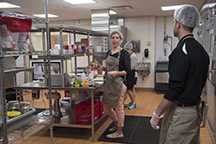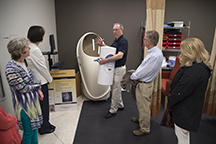May 20, 2016
New center to nourish Purdue’s exercise and nutrition research programs
 |
|
Purdue’s new Nutrition and Exercise Clinical Research Center will expand lab space for scientists studying clinical nutrition, exercise, appetite and obesity. The center includes a metabolic research kitchen as part of its bionutrition services. Sarah Huber is a research production assistant in the kitchen. (Purdue University photo/Mark Simons) |
WEST LAFAYETTE, Ind. — Some of the nation’s leading researchers in clinical nutrition, exercise, appetite and obesity will be able to enhance their research programs, thanks to a new center at Purdue University.
The Nutrition and Exercise Clinical Research Center also will provide undergraduate and graduate students various learning opportunities alongside these top researchers as they evaluate diet and exercise interventions.
“This center will help us achieve national preeminence in clinical nutrition research through better understanding of the relation of diet and health, nutrition and exercise interactions, predictors of food intake and choice, and weight loss and gain,” said Connie Weaver, distinguished professor and head of the Department of Nutrition Science. “Our faculty will be able to expand their research projects to better understand how diet quality influences chronic disease prevention and weight management, especially as it relates to hunger and satiety, which an make following diets difficult. We’ll also be able to offer community members opportunities to learn more about diet, fitness and well-being, and hopefully build on more partnerships with corporate entities.”
The 4,000-square-foot center is in Stone Hall and will focus on research areas related to appetite, metabolism, and obesity; life-stage health and well-being; diet, exercise and chronic disease prevention or management; pre-digestive influences on digestion, metabolism and health; diet and exercise science translation and communication. The center also will collaborate with the National Institutes of Health supported Indiana CTSI Clinical Research Center and the Indiana University School of Medicine.
The center includes facilities and laboratories for:
- bionutrition services, including a metabolic research kitchen and an ingestive behaviors assessment area;
- bone, muscle and body composition assessment, including body imaging equipment and muscle and fat tissue sampling;
- blood pressure monitoring;
- neural imaging, using FMRI, to clarify relationships between stress, cognition and metabolism;
- outpatient clinical health, energy expenditure and function assessment services;
- exercise testing and training facilities and equipment;
- interview, counseling and health motivation services.
 |
|
Scientists will be able to use the new clinical research center to evaluate body composition. Wayne Campbell, professor of nutrition science, discusses the center’s BodPod, which is used to measure fat and lean body mass. (Purdue University photo/Mark Simons) |
“The availability of state-of-the-art facilities for the assessment of sensory function, appetite, diet, energy expenditure, metabolism and body composition, along with settings to communicate with varied audiences, will open new opportunities to engage in translational science,” said Richard Mattes, distinguished professor of nutrition science, who has studied how sensory perception relates to appetite, including satiety - the feeling of being full. “The metabolic research kitchen, in particular, allows us to improve the scope, quality and quantity of dietary interventions.”
The exercise laboratory includes a variety of equipment including resistance training, cardio and free weights. An individual’s heart rate and metabolic data can be tracked while using the equipment.
The new center was dedicated on May 5 during an event that was part of the Department of Nutrition Science’s 110th anniversary celebration.
Purdue’s Department of Nutrition Science is housed in the College of Health and Human Sciences. The department, led by Weaver, who is a member of the National Academy of Medicine, is known for its research in calcium, vitamin D and bone health; appetite, metabolism and obesity; and cancer prevention. Two of the department’s professors also have served on recent U.S. Dietary Guidelines advisory committees.
Writer: Amy Patterson Neubert, 765-494-9723, apatterson@purdue.edu
Sources: Connie Weaver, weavercm@purdue.edu
Richard Mattes, mattes@purdue.edu

